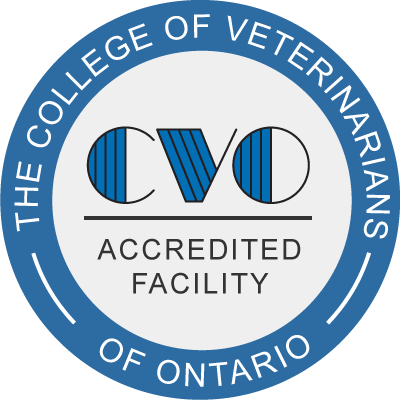The Bloor West Village Animal Hospital provides a variety of medical services on site.
Internal Medicine
Internal medicine refers to treatments and diagnostics (tests) geared towards metabolic, organ, hormonal and hematological (blood) problems. There are many sub categories to internal medicine, but the basic idea is that your companion animal may be exhibiting certain symptoms, and the veterinary team uses a combination of physical exam, history taking and diagnostic tests to identify the underlying problem.
The physical exam and history taking are essential steps in searching for the underlying problems of diseases, and when done well can provide many clues. Through the physical exam, the Veterinarian assesses your companion’s vital signs (heart rate, temperature, respiratory rate, perfusion) and looks for any abnormalities of the different body systems. During the exam the Veterinarian will also ask you questions about your companion’s medical history, about the specific problem your companion has come in for and about your home environment, all in an attempt to gather more clues.
After the physical exam and history taking are completed the Veterinarian will use the clues they have gathered to offer the most appropriate diagnostic tests, or sometimes treatments that they can provide. It is important to understand that you as the owner are considered part of the veterinary team, that you play an integral part in this process, and that when it comes to your companion animal you are the expert.
Diagnostic Imaging
Diagnostic imaging refers to the use of tools such as digital radiography, ultrasound machines and endoscopes to look at the internal organs of your companion animal. The veterinary team will use these technologies to give them additional information about their patients’ disease processes in order to come up with the most appropriate treatments. If you have any questions regarding diagnostic imaging please feel free to call and ask us.
Cardiology
Cardiology refers to the study and treatment of the heart. Heart disease can affect our patients at any age, although it affects older animals more often. Every time you bring your companion animal in for an exam, the Veterinarian will listen to their heart to assess for any changes or abnormalities as a screening test. If the Veterinarian feels they hear something abnormal they may offer to do further tests such as radiographs or a cardiac ultrasound or they may ask you to come back for another listen in a week or two to ensure the abnormality persists.
One of the major results of heart disease is reduced heart function or heart failure. What happens in heart failure is that the heart requires more energy to pump blood to the rest of the body than it used to. As a result the organs of the body, the heart included, get less oxygen and less energy. Couple the reduced energy to the heart with the increased demand for energy to pump blood and the cycle of heart failure worsens. Often the heart itself cannot be repaired however there are many medications that can manage the symptoms making it easier for the heart to pump blood to the organs of the body, and extending our patients lives.
Dentistry
Dental disease is becoming a much more recognized problem in companion animals, which makes sense. We brush our teeth 2-3 times a day and still require annual or semi annual cleanings, so it is reasonable that our companion animals would need cleanings as well. The dental cleaning procedure is done under general anesthesia and consists of a prophylactic cleaning and polish (just like at a human dentists office) as well as dental radiographs, if required extractions can be performed (with a local nerve block) or your companion can be referred for endontic procedures (such as a root canal). During the surgery your companion will be on IV fluids to maintain blood pressure and hydration, and is monitored by anesthetic monitoring devices as well as a member of the nursing staff. Perioperative pain management is given before and after the procedure if extractions are required.
In addition to prophylactic cleanings, the veterinary team can provide you with information on diets that help maintain healthy teeth, as well as advice on brushing teeth and applying oral rinses.
If you have any questions regarding our dental procedures, please feel free to call and ask us.
Dermatology
Dermatology refers to the study of skin. It is common for cats and dogs to have a variety of skin diseases with causes ranging from parasites to allergies. Skin diseases are usually diagnosed through a combination of physical exams, skin scrapings, biopsies and blood tests.
Fleas are a common cause of skin irritation for dogs and cats in Toronto during the late summer months all the way up to December some years. Our veterinary team has a variety of ways to help prevent exposure of your companion animals to fleas, for more information feel free to call and ask us.

